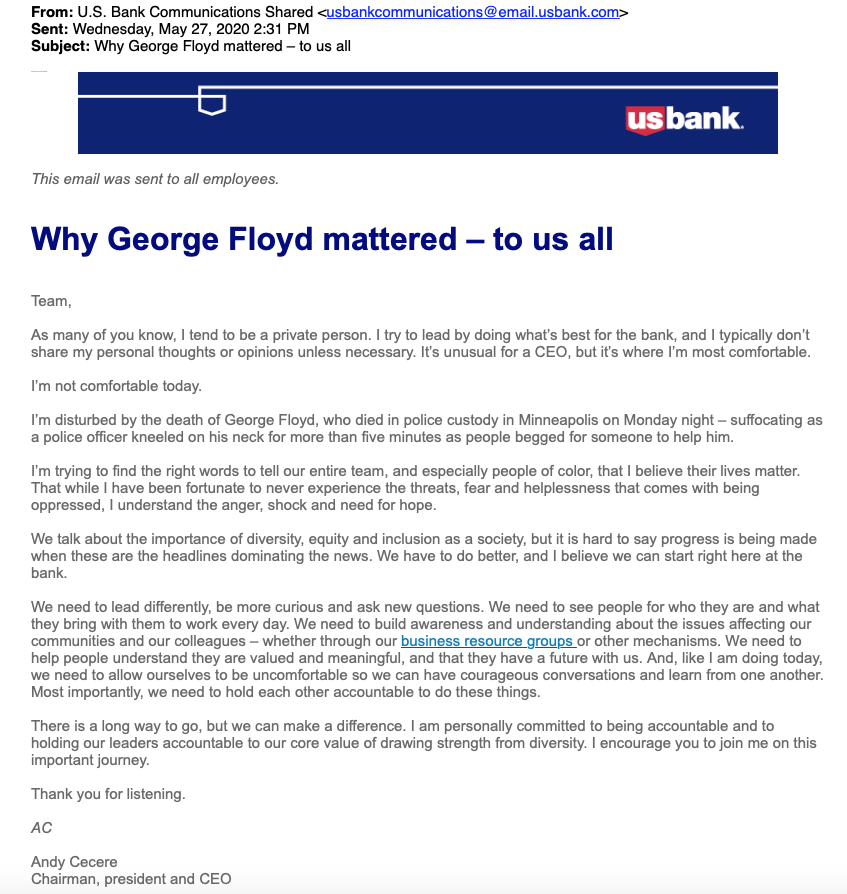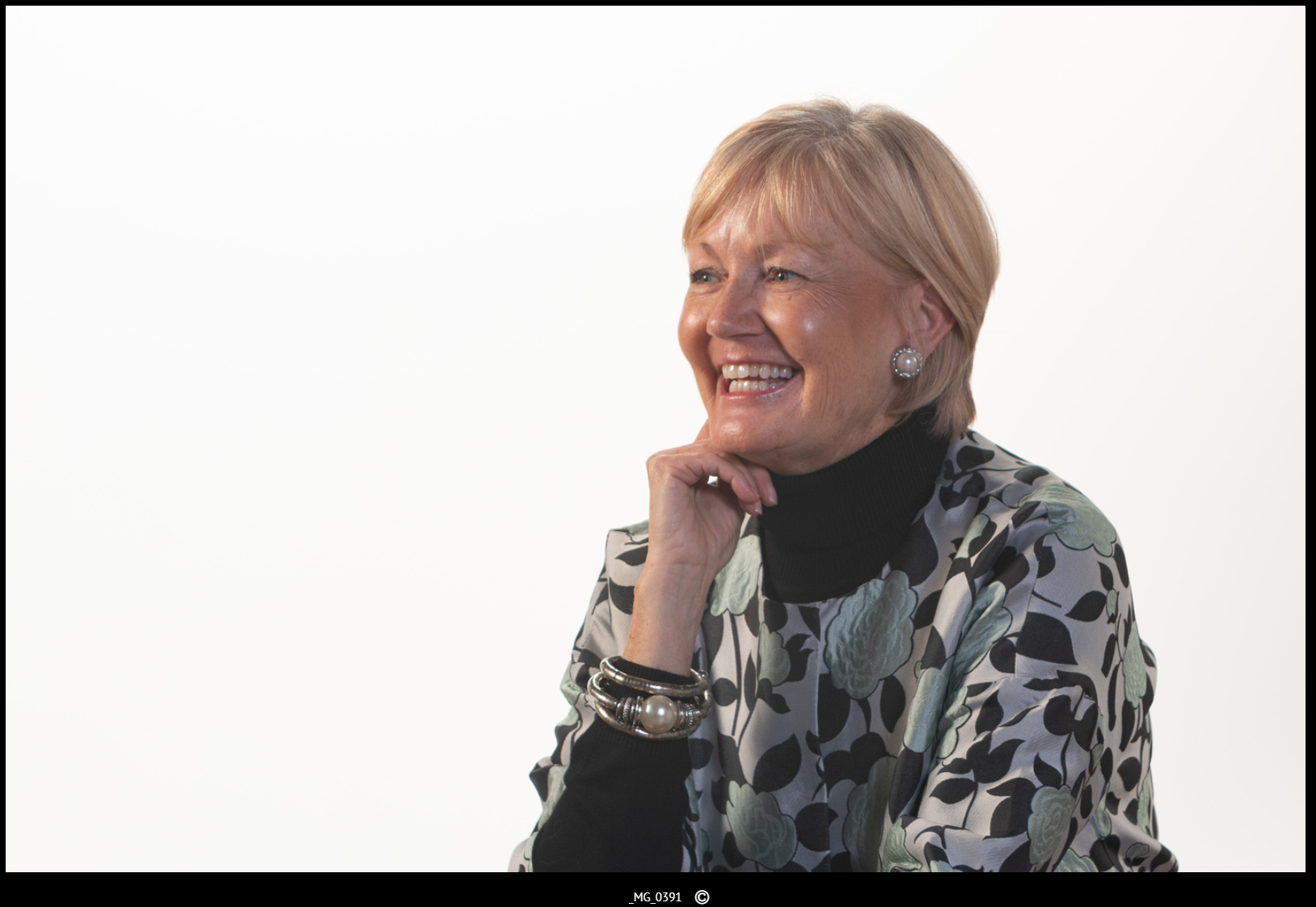What I Saw at the Reunion
October 20, 2022
Speechwriters as "quiet adrenaline junkies" with "superiority complexes"—and other notions that emerged at the 2022 World Conference of the "Professional Just a Few Bullets Association."
As a trade journalist, I used to cover communication-industry conferences as compellingly as industry conferences could be covered, I thought. Now that I run an industry conference, and oversee the association that puts it on, it’s impossible for me to cover the thing objectively enough, and inadvisable to cover it subjectively enough.
And if you think I trust another journalist enough to commission her or him to cover the World Conference of the Professional Speechwriters Association as colorfully as I think a conference should be covered to make it the least bit interesting to someone who wasn’t there—well, I don’t. Someday someone might write “Fear and Loathing at the PSA World Conference,” but not at my invitation!
So unfortunately, the annual conference usually goes uncovered, aside from the social media accounts of the participants, which are fun but fragmented.
But since this year’s conference was our first in person since 2019—and since its agenda seemed more thematically coherent than usual—I thought I’d see if I could get across the feeling and some of the substance of the conference by merely listing some things that were said and done—as I remember them, from the frenzied blur of my position as PSA executive director, conference emcee, greeter of about 60 returning speechwriters (many of them good friends by now) and meeter of another 60 new participants from around the world.
Here are the most interesting things that I remember from last week; I hope readers will use the comments to add what they remember, too.
• The annual pre-conference Speechwriting School happily reminded me that eager and bright young people are always coming into the business with a hundred good questions and big speechwriting dreams. In my remarks between faculty lectures there, I found myself carefully calibrating the tone of my comments between knowing, and hope. And in personal conversations, I heard myself happily telling the youngest speechwriters about all the great fellow travelers they have in the PSA, should they choose to make speechwriting their professional adventure.
• The keynoter was Brenda Jones, who wrote speeches for a couple decades for Congressman John Lewis. I’m not sure which was more profound: The tears I saw in her eyes as we watched a video of a Lewis speech she had written. Or what she said about a farewell op/ed she wrote on Lewis’s behalf while he was dying and unable to offer his thoughts. She solemnly said she spent most of the creative process editing—trying to take every last part of herself out of the thing, and making sure the final draft was only what John Lewis would think and say. Who but a speechwriter could even conceive of the possibility of such a thing—let alone hope she achieved it?
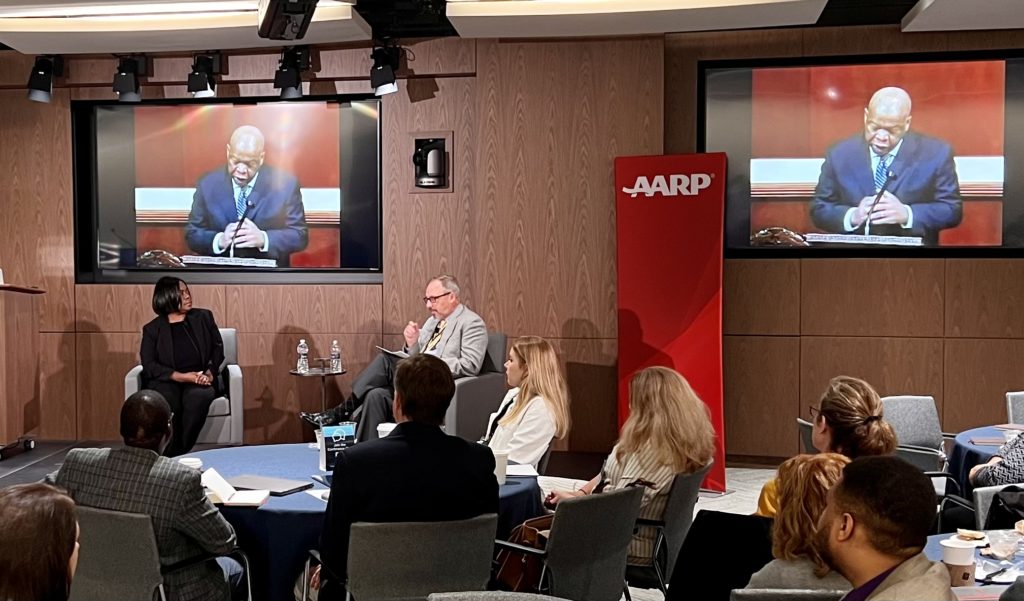
• (I’d forgotten the sound of ten dozen people who work largely in isolation in their organizations, suddenly placed in a roomful of colleagues and simply given a chance to talk. It is loud.)
• With some trepidation, I had invited a linguistics Ph.D. from Switzerland named Gwynne Mapes, who had conducted an academic study of speechwriters, to give a talk that I provocatively titled, “Humble Servants with a Superiority Complex: How to Manage Your Own Ego, Too.” As Dr. Mapes offered her good-humored insights about the preening pride that many speechwriters had betrayed to as they spoke about being back-stage people who never preen and have no pride, her whole audience laughed, sometimes belly-laughed, at themselves.
• Since putting on the inaugural PSA World Conference in 2014, I’ve wanted spirited debate to be a part of this event, in order to keep things interesting for these mid-career professionals, and to make sure we aren’t drinking our own bathwater. Alas, these have been some pretty creepy years to stage professional arguments without risking unproductive, bruising political donnybrooks. Enter Axios president and co-founder Roy Schwartz, who in conversation with PSA member Kristen Daly, explained at length his view that the best way to communicate today is through “smart brevity.” This audience of long-form writers was being pretty polite until Schwartz added a blithe remark to the effect that young people could learn more working for a year at a start-up than spending four years at college. (To a crowd that included 20 speechwriters from institutions of higher education.) I can’t recreate the conversation here, but I will say that one way to galvanize a community is to present it with a common antagonist. (No media executives were injured at the conference.)
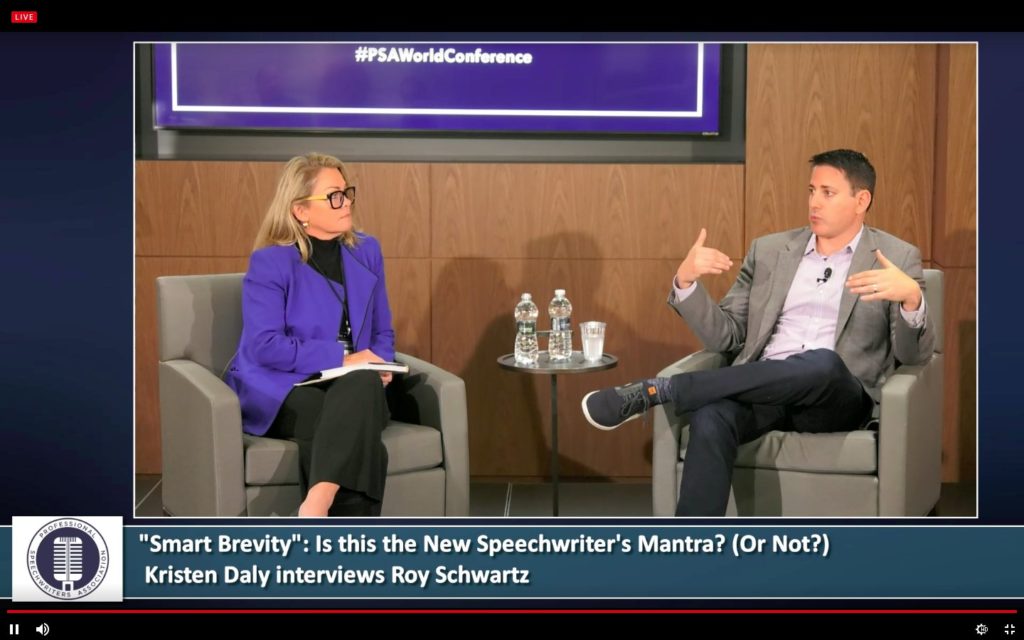
• This event was generously hosted by AARP, whose downtown D.C. headquarters boast a rooftop deck with an open rotunda that looks hilariously as if were constructed specifically for the Cicero Speechwriting Awards-sponsored conference cocktail party that we held there. In a toast, the 2022 Cicero Grand Award winner, Paul Harang, created mass mirth in the speechwriting crowd when he observed that speechwriters are adrenaline fiends—but “the most boring kind possible!” Speechwriters don’t thrive on physical derring-do. “We go for the buttoned-up, professional adrenaline hit of high-pressure project deadlines and difficult-to-please bosses. We are quiet adrenaline junkies.”
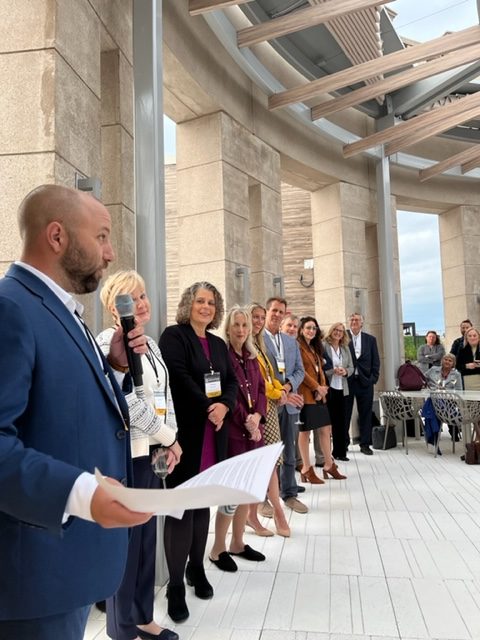
• I recused myself from a panel on the last morning, on the future of speechwriting and the future of the PSA, sitting in the back of the room taking notes, as the illustrious practitioner and teacher of speechwriting Eric Schnure and his panel—and the rest of the conference participants—shared insights about their demanding, changing livelihoods, and ideas about how the PSA can be an ever more useful resource as we tremble on our second decade of existence.
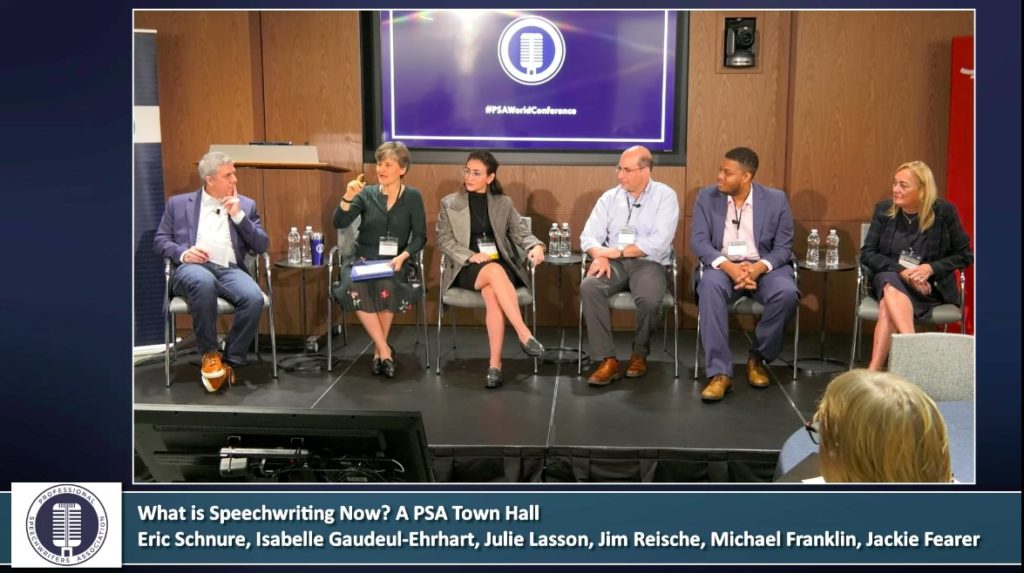
• I haven’t fully processed that conversation, and plan to listen to it again via video replay, and to show it to members of the PSA Advisory Council who were not in attendance. Proposed with varying degrees of specificity were: a doubling-down of the diversity efforts of the last few years … the creation of a list of speechwriters willing to offer their services pro bono to social movers with big communication needs but small budgets … more regional and industry-specific PSA gatherings … and the direct sharing of our communication wisdom to CEOs and other leaders, if only to make them better speechwriting clients. Perhaps biggest-picture of all, longtime European Commission speechwriter Isabelle Gaudeul-Ehrhart suggested that the PSA help the world’s speechwriters learn how to tell, “for a more complex world, more complex stories.” That is, stories about not one hero transforming things, but “many heroes,” including “heroes who don’t like each other,” who find ways to work together to solve climate change and other gigantic problems.
• (We even debated whether modern leadership communication people, with all their varied responsibilities, should be called “speechwriters”—with Eric Schnure remarking that speechwriter “might be the worst title … except for all the other ones we’ve tried!” Schnure later cracked that in light of the kinds of requests speechwriters get, maybe the PSA should be rebranded “The Professional Just a Few Bullets Association.”)
• Boe Workman, who has written speeches and handled communications for every AARP CEO since 1993, isn’t retiring anytime soon, but gave what felt like a valedictory address, to close out the conference. Workman worried it was too long, but he didn’t feel like shortening it. The speech began with a quotation of Winston Churchill: “The further back you look, the further ahead you can see.” To the ear-candy spoiled mind, Workman began with a stunningly learned and rigorous review of the foundations of rhetoric and its fortunes over the millennia—before delivering a series of directives for modern speechwriters. Did the speech’s profundity justify its lack of brevity? Well, I’m paying to have it printed in full in the December issue of Vital Speeches of the Day, so you know where I stand. I also think the text could become a standard introduction to speechwriting, offered by the PSA for years to come. In any case, it sure felt good to give a great speechwriter the lectern, and the last word, at whatever length he goddamn well pleased. (While the boss and co-author who had introduced him, AARP CEO Jo Ann Jenkins, looked on from the front row.)

• Professional speechwriters can spot a cue three paragraphs away. In my conference-closing remarks, I referred to a standing ovation that PSA’s longtime chief operating officer Benjamine Knight Barger once called for me at the end of a long-ago World Conference. In order to set up a similar call for a standing ovation for her, I said I’d recently named Benjamine president of Pro Rhetoric, the organization that convenes the PSA. I had several paragraphs to go before calling for the ovation, but the speechwriters caught my drift right away and leapt to their feet and turned to the back of the room to bathe Benjamine in a great roar of applause—stunning her, and leaving me to toss the rest of the script in the air.
• In the delirious wake of every PSA World Conference, I hear myself babbling in astonishment that this ridiculously rich community actually gathered again from around the world, at our suggestion, in one room (and a dozen bars and restaurants across D.C.), for three days. I cannot believe that I actually did manage to reconnect with half of them and at least begin relationships with most of the rest. I cannot understand how fast some of these friends are made; at one point I turned to a university speechwriter I’d just met and yelled at her, “Do you feel like we’ve known each other twenty years?” She shouted back, “Yes!” I almost cannot cope with my own embarrassing, gobsmacking good fortune as the son of two introverted writers (and a writer with my own love of being alone), to know all these fine and fascinating people. And whoever I’m celebrating with post-conference, has to listen to my astonishment once again.
And this year, I guess you do too.


